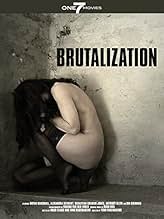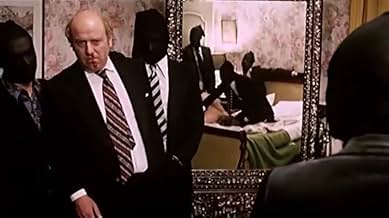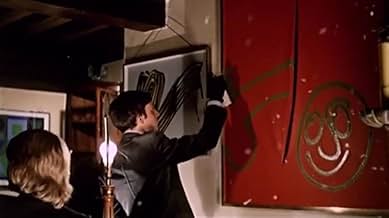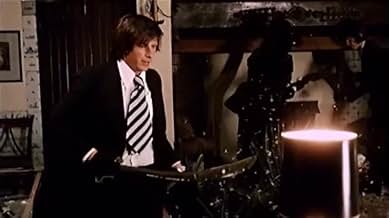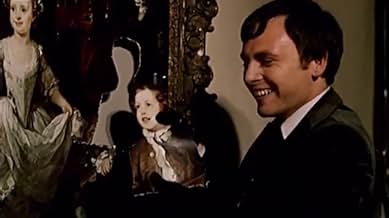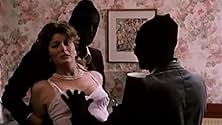Adicionar um enredo no seu idiomaA gang of wealthy ne'er do wells rape and terrorize women for fun and force their husbands to watch. A police detective tries to catch them, but can he break their twisted loyalty to one ano... Ler tudoA gang of wealthy ne'er do wells rape and terrorize women for fun and force their husbands to watch. A police detective tries to catch them, but can he break their twisted loyalty to one another?A gang of wealthy ne'er do wells rape and terrorize women for fun and force their husbands to watch. A police detective tries to catch them, but can he break their twisted loyalty to one another?
- Direção
- Roteiristas
- Artistas
- Direção
- Roteiristas
- Elenco e equipe completos
- Produção, bilheteria e muito mais no IMDbPro
Avaliações em destaque
It has been said of the 1960s, if you can remember them, you weren't really there; the same has on occasion been said of the 1970s. This film dates from 1973, and I must have been there because I watched it on Monday and didn't remember it, although shortly before he uttered them, I repeated the villain's last words verbatim – words that can't be repeated here.
I'd probably forgotten "Because Of The Cats" not because of the passage of 4 decades, but because it is such rubbish.
This is an off-beat film, even for the 1970s; the gang rape scene at the beginning is both extremely graphic and very realistic, but not really necessary; the gratuitous male nudity is inexcusable, as is the wooden dialogue. As for the terrible plot...was any police investigation in the UK, Holland or anywhere ever conducted like this? There was no DNA in the 70s, but the same cannot be said for fingerprints.
And the detective, this is not the Van De Valk I remember from the TV series. Unless you have an unhealthy fascination for pubic hair and/or male genitalia, give this one a miss.
I'd probably forgotten "Because Of The Cats" not because of the passage of 4 decades, but because it is such rubbish.
This is an off-beat film, even for the 1970s; the gang rape scene at the beginning is both extremely graphic and very realistic, but not really necessary; the gratuitous male nudity is inexcusable, as is the wooden dialogue. As for the terrible plot...was any police investigation in the UK, Holland or anywhere ever conducted like this? There was no DNA in the 70s, but the same cannot be said for fingerprints.
And the detective, this is not the Van De Valk I remember from the TV series. Unless you have an unhealthy fascination for pubic hair and/or male genitalia, give this one a miss.
Get a bunch of hormonally-stoked, wealthy, presumably-untouchable teen boys together in an iron-clad clique and let the proverbial sex and mayhem fly. Released in 1973, around the time David Hemmings had his hands full with "Unman, Wittering, & Zigo," and James Mason was dealing with "Child's Play," this youth delinquency story centers around a group of six well-to-do, but never-do-well teens who perpetrate rape and extreme vandalism. Bryan Marshall is the put-upon detective in Amsterdam who is assigned the case after a particularly graphic gang rape takes place in his metropolitan jurisdiction. All leads point to a Dutch seaside town and the six lads, who are seen as upstanding youth in the community, as the perpetrators.
The intriguing element about this otherwise slow-moving affair is the realistic bent director Fons Rademakers brings to the proceedings. The gang rape which opens the film has an air of frank reality not seen in many films during the '70s. His technique doesn't excuse the horrifying nature of the moment by using quick-cut editing, or slashing guitars on the soundtrack, or wild lighting and intense close-ups, all of which would be the way most commercial-driven directors of today would handle this sickly scene. We are forced to watch, along with the victim's husband, as she is taken by five of the six members of the gang. The vision of her just watching her husband with disgust is a hard image to shake.
Rademakers introduces naturalistic elements like this throughout. An interrogation scene of the boys' girlfriends by Marshall (which includes the barely-on-screen presence of Sylvia Kristel) is handled with nuance usually reserved for Hollywood A-type dramas. The natural, everyday-life approach to dressing and undressing (Marshall is seen full frontal, as is his prostitute girlfriend, the entrancing Alexandra Stewart)is executed in a manner completely devoid of any awareness of the camera. A Harrison Ford or Ben Affleck will always take care to cover their privates in a "bedroom" scene with a sheet or a back turn just at the right moment, which immediately makes an audience remove themselves from the story, thinking, "oh, that's right, he's a star; he doesn't want his ding-a-ling to show." Here, it's not cinema verite, but it is just natural.
Even though Marshall's not shy about revealing his shortcomings, it can also be noted he isn't shy about showing much range in his acting abilities. Both he and the criminal lads display a woefully limited amount of acting chops. On the other hand, the women in this film emote a more believable and compelling performance.
Unfortunately, the music score is oftentimes obnoxiously introduced. It sounds like the same cue is dropped in at varying points of transition without any thought of its dramatic effect or variance in rhythm or pitch on the scenes. It's quite distracting from any drama being built up on the screen by Rademakers.
Overall, the mystery of the story, which centers around a cult-like devotion amongst the boys, doesn't lend any surprises nor any suspense-filled moments. It's fairly threadbare. But the naturalness of certain scenes mentioned before, make it a step above the usual Euro-low-budget fare of the '70s. It's a naturalness like fellow Dutchman Verhoven exhibited in "Turkish Delight" and "Keetje Tippel", but without his over-the-top shock values. My rating ** out of ****.
The intriguing element about this otherwise slow-moving affair is the realistic bent director Fons Rademakers brings to the proceedings. The gang rape which opens the film has an air of frank reality not seen in many films during the '70s. His technique doesn't excuse the horrifying nature of the moment by using quick-cut editing, or slashing guitars on the soundtrack, or wild lighting and intense close-ups, all of which would be the way most commercial-driven directors of today would handle this sickly scene. We are forced to watch, along with the victim's husband, as she is taken by five of the six members of the gang. The vision of her just watching her husband with disgust is a hard image to shake.
Rademakers introduces naturalistic elements like this throughout. An interrogation scene of the boys' girlfriends by Marshall (which includes the barely-on-screen presence of Sylvia Kristel) is handled with nuance usually reserved for Hollywood A-type dramas. The natural, everyday-life approach to dressing and undressing (Marshall is seen full frontal, as is his prostitute girlfriend, the entrancing Alexandra Stewart)is executed in a manner completely devoid of any awareness of the camera. A Harrison Ford or Ben Affleck will always take care to cover their privates in a "bedroom" scene with a sheet or a back turn just at the right moment, which immediately makes an audience remove themselves from the story, thinking, "oh, that's right, he's a star; he doesn't want his ding-a-ling to show." Here, it's not cinema verite, but it is just natural.
Even though Marshall's not shy about revealing his shortcomings, it can also be noted he isn't shy about showing much range in his acting abilities. Both he and the criminal lads display a woefully limited amount of acting chops. On the other hand, the women in this film emote a more believable and compelling performance.
Unfortunately, the music score is oftentimes obnoxiously introduced. It sounds like the same cue is dropped in at varying points of transition without any thought of its dramatic effect or variance in rhythm or pitch on the scenes. It's quite distracting from any drama being built up on the screen by Rademakers.
Overall, the mystery of the story, which centers around a cult-like devotion amongst the boys, doesn't lend any surprises nor any suspense-filled moments. It's fairly threadbare. But the naturalness of certain scenes mentioned before, make it a step above the usual Euro-low-budget fare of the '70s. It's a naturalness like fellow Dutchman Verhoven exhibited in "Turkish Delight" and "Keetje Tippel", but without his over-the-top shock values. My rating ** out of ****.
A gang of six wealthy hoodlums break into a married couple's house and rape the wife while forcing the husband to watch. Thus begins a dogged investigation by a determined detective who quickly finds that their cult-like solidarity can be a serious obstacle to breaking them. Here's another little oddity that's been particularly hard to track down. This was originally released in the US with an X rating and was later re-edited for an R. All of the rips I have seen are 94 minutes, but the IMDb run-time for the film is 98 minutes. Thats a big discrepancy, even allowing for different frame rates. I will just have to keep looking for that illusive 98 minute cut.
This film is now available in all its 98 minute glory on a Dutch (Region 2) DVD for a very reasonable price. The really good news is that the rape scene is nothing like as graphic or as protracted as other reviewers suggest. The five minutes are intercut with the police questioning of the victims. I'm at a loss to understand why four minutes were cut from the original British release as the rape scene itself lasts for no more than two minutes.
My title for this review has a question mark because it is very different from the treatment we have become used to in long-form dramas like "The Bridge". The film is very much of its time. It is certainly not as action-packed as modern American dramas which may be why some reviewers find it slow. I thought the portrayal of Van Der Valk was reasonably true to the novels save, of course, for the philandering with Feodora.
The film as a whole worked well aside from the hippy-trippy bit towards the end which really stamped it as being from the early 1970s, although I think that the basic plot idea or rich kids going bad is one of Freeling's less believable stories.
My title for this review has a question mark because it is very different from the treatment we have become used to in long-form dramas like "The Bridge". The film is very much of its time. It is certainly not as action-packed as modern American dramas which may be why some reviewers find it slow. I thought the portrayal of Van Der Valk was reasonably true to the novels save, of course, for the philandering with Feodora.
The film as a whole worked well aside from the hippy-trippy bit towards the end which really stamped it as being from the early 1970s, although I think that the basic plot idea or rich kids going bad is one of Freeling's less believable stories.
In what seems to almost come out of today's headlines.....a group of rich boys decide to rape and terrorize people for a goof.
They rape middle-aged women in their own house while forcing their husbands to see it all. All this while destroying their personal property. You see paintings get slashed, furniture get ripped up, and personal items smashed just for the fun of it. And these are valuable items. And the rape scenes may be hard to watch for some.
Then we get a police drama. The inspector in question targets the group for imprisonment. We see a lot of technical details about police work. Euro-flicks like to do that it seems. (Remember "Man on the Roof?") These bits almost play like a documentary.
The pace seems to get slower as we move on, but the intriguing characters keep it in focus. And the culprits are almost likable despite their sliminess.
This film is hard to find. But worth a look. The director Fons Radermakers (spelling?) later won a Foreign Film Oscar for "The Amateur."
They rape middle-aged women in their own house while forcing their husbands to see it all. All this while destroying their personal property. You see paintings get slashed, furniture get ripped up, and personal items smashed just for the fun of it. And these are valuable items. And the rape scenes may be hard to watch for some.
Then we get a police drama. The inspector in question targets the group for imprisonment. We see a lot of technical details about police work. Euro-flicks like to do that it seems. (Remember "Man on the Roof?") These bits almost play like a documentary.
The pace seems to get slower as we move on, but the intriguing characters keep it in focus. And the culprits are almost likable despite their sliminess.
This film is hard to find. But worth a look. The director Fons Radermakers (spelling?) later won a Foreign Film Oscar for "The Amateur."
Você sabia?
- CuriosidadesFilm debut of Sylvia Kristel.
- Versões alternativasOriginally released in the U.S. with an "X" rating from the MPAA, in 1974 the film was edited and this version received a rating of "R".
- ConexõesFeatured in Underwater Nude Scenes (2016)
Principais escolhas
Faça login para avaliar e ver a lista de recomendações personalizadas
- How long is Because of the Cats?Fornecido pela Alexa
Detalhes
- Data de lançamento
- Países de origem
- Idioma
- Também conhecido como
- Brutalization
- Locações de filme
- Empresas de produção
- Consulte mais créditos da empresa na IMDbPro
Bilheteria
- Orçamento
- NLG 1.200.000 (estimativa)
- Tempo de duração1 hora 38 minutos
- Mixagem de som
- Proporção
- 2.35 : 1
Contribua para esta página
Sugerir uma alteração ou adicionar conteúdo ausente

Principal brecha
By what name was Because of the Cats (1973) officially released in Canada in English?
Responda

